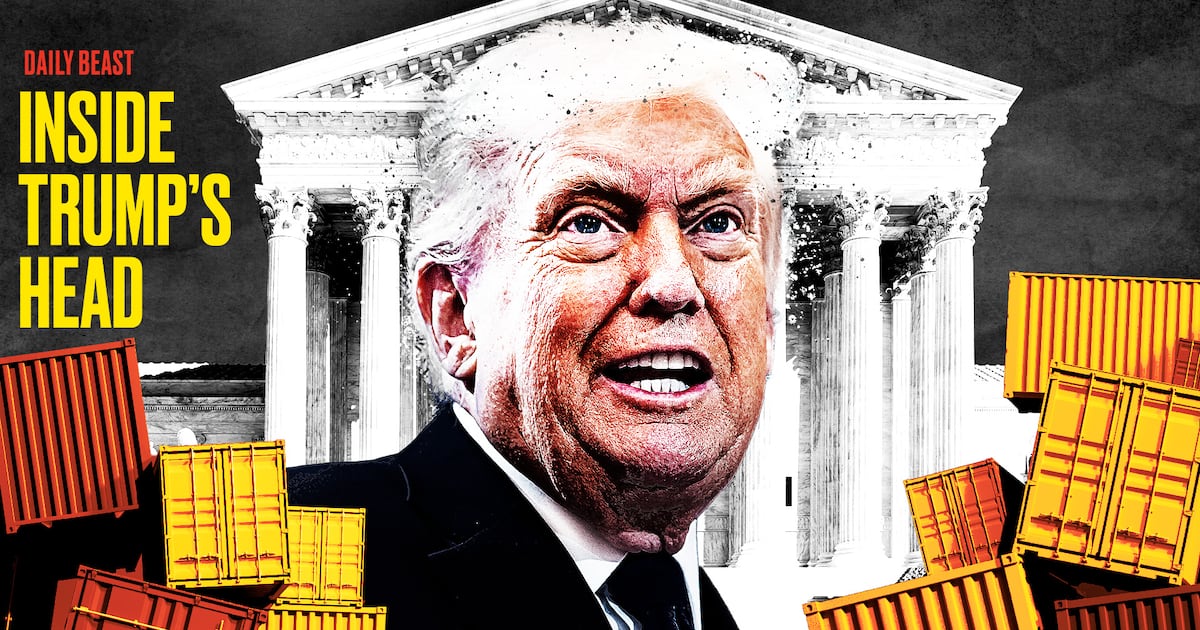Eric Holder may not be the worst attorney general in American history, but he is the most recent—which amounts to nearly the same thing.

Despite its exalted status as the nation’s “top cop,” the job is best understood as a dumping ground for intermittently competent bulldogs who take out the president’s trash and act as his public-relations human shield. That was the basic duty of George W. Bush’s troika of torture apologists: John Ashcroft, Alberto Gonzales, and Michael Mukasey. Ashcroft went so far after the 9/11 attacks as to argue that dissent itself verged on the unconstitutional.
"Those who scare peace-loving people with phantoms of lost liberty,” Ashcroft told Congress, "your tactics only aid terrorists.”
For his part, Holder has dissolved completely into his cabinet role like George C. Scott becoming George Patton. Such perfection may well be his undoing as observers from across the ideological spectrum—and in both houses of Congress—voice increasingly loud howls of anger and dissatisfaction with the former federal prosecutor.
As Michael A. Walsh notes in the New York Post, Holder is directly involved in essentially every aspect of President Obama’s second-term scandalpalooza. Not only did he sign off on the search warrant for Fox News’s James Rosen’s personal emails, he is at the center of questions over the state’s broad surveillance of the AP, an operation that has raised hackles across the political spectrum regarding First Amendment issues and civil-liberties concerns. (Holder did himself no favors by recusing himself from the AP case in vague and uncertain terms). Walsh notes that “even the Internal Revenue Service’s targeting of conservative and Tea Party groups for special scrutiny—[finds its] nexus at the top of the Justice Department.”
Such conservative ire is nothing new. Less than a year ago, congressional Republicans—along with 17 Democrats—voted to hold Holder in contempt for failing to deliver documents and testimony related to the “Fast and Furious” gun-walking operation directed from an Arizona office of the Bureau of Alcohol, Tobacco, Firearms, and Explosives, which answers to the attorney general. Although timed to the confirmation vote of CIA director John Brennan, Sen. Rand Paul’s epic filibuster in March was specifically targeted at Holder’s refusal to give a simple answer to questions about the use of domestic drones. Now the House Judiciary Committee is reportedly looking to investigate whether Holder perjured himself before Congress in relation to the press probes.
But it’s not just right-wingers who are up in arms over Holder. Apart from his casual approach to civil liberties and the First Amendment, folks on the left are livid that the attorney general can find no one on Wall Street to perp-walk directly from the corner offices of JPMorgan into federal prison. Progressive senators such as Sherrod Brown (D-OH) and Elizabeth Warren (D-MA) are asking the DOJ exactly when “too big to fail” morphed into “too big to jail.” Pathetically, Holder told Congress that he is daunted by the size of the institutions he is investigating and that the sheer bigness of financial institutions “has an inhibiting influence—impact on our ability to bring resolutions that I think would be more appropriate ... I think that is something that we—you all—need to consider.”
That sort of special pleading is unlikely to win friends and influence people on Capitol Hill. Nor is Holder’s newfound willingness to acknowledge that mistakes were made, “Look, Eric sees himself fundamentally as a progressive, not some Torquemada out to silence the press,” an unnamed friend told The Daily Beast on Tuesday.
There’s no reason to believe that Holder will be sent packing anytime soon or that he’s somehow at cross-purposes with the president. Obama has voiced nothing but support for his attorney general, which means that there’s every reason to keep questioning Holder’s truthfulness. One of his first actions upon taking office was to underscore the Obama administration’s position that federal resources would not be targeted at medical-marijuana users and providers who complied with laws in states where the stuff is legal. The result? A record number of raids against medical-marijuana dispensaries in California and elsewhere in Obama’s “war on weed.” And yet Holder continues to insist, as he did last year before Congress, that "we limit our enforcement efforts to those individuals and organizations that are acting out of conformity with state laws." So Holder is either out of touch with reality or following a script scribbled together in the Oval Office. Neither prospect is comforting given that Obama’s DOJ has yet to state its position regarding the full legalization of pot in Colorado and Washington state.
It’s daunting to remember that Holder served as a deputy attorney general in Janet Reno’s Justice Department during the Clinton years. What lessons in self-preservation and executive-branch overreach might he have learned under Reno, the second-longest-serving attorney general in American history and surely one of the worst?
Recall that Reno was at best Clinton’s third pick for the position, being selected only after his first two selections were undone by revelations that they had employed illegal aliens as nannies. Reno’s tenure was marked by horrifyingly misguided law-enforcement debacles such as the deadly standoff between federal agents and the Branch Davidians at Waco, Texas, and the armed raid to separate 6-year-old Elián González from his American relatives and return him to his father in Cuba. But she held on as a lightning rod, absorbing political punishment before it could reach her boss.
Reno spent much of her time in office threatening censorship of violent videogames and other forms of popular culture and was an active proponent of mandating technology standards such as the Clipper chip and “key escrow” that would have given the federal government full access to all electronic communications at the dawn of the Internet age. She was by all accounts a driving force behind 1996’s Communications Decency Act, legislation that would have essentially regulated the Internet akin to broadcast television and radio stations (most of its provisions were struck down in the 1997 Supreme Court case Reno v. ACLU, with a unanimous ruling that the law eviscerated the First Amendment).
For all that, Reno was the one cabinet member who stayed for the entire run of the Clinton administration. She did the ugly jobs on behalf of the president, and took the political heat for them.
Now Holder is doing the same for the Obama White House—and perhaps no one understands the essential role of the attorney general better than our current president. In 2007, then-senator Obama told Larry King that he voted against confirming Albert Gonzales as attorney general because Gonzo “seemed to conceive his role as being the president’s attorney instead of being the people’s attorney.”
Upon taking over the Oval Office, Obama quickly rethought many long-held beliefs, including his views on executive power. It’s no wonder he now has a “president’s attorney” of his own, and every reason to retain his scandal-plagued counsel.






